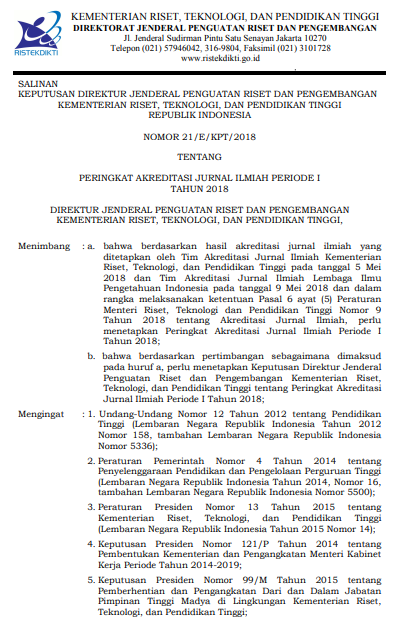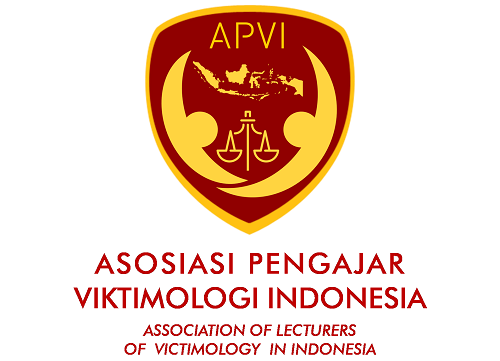Criminal Sanction Reduction Policy: Mental and Intellectual Disabilities Review from the Purpose of Punishment
Abstract
In the realm of criminal law, it is acknowledged that criminal offenses may be perpetrated by a broad spectrum of individuals, including those with disabilities, spanning both mental and intellectual realms. The term “disability” includes individuals with physical or intellectual impairments who could not previously be sanctioned. However, Law No. 1 of 2023 has provided for the imposition of sanctions for people with mental or intellectual impairments. This study employs a normative research methodology, utilizing a statutory approach through the examination of various literature and journals focused on criminal law policy. Specifically, it addresses the implementation of incarceration for individuals with mental and intellectual disabilities. Through descriptive-analytical methods, this research highlights that Article 38 of the New Criminal Code expands the scope of criminal sanctions applicable to individuals with mental and intellectual disabilities. This provision appears to be at odds with Article 44 of the Criminal Code, which exempts persons with such disabilities from criminal liability, suggesting a contradiction where Article 38 permits the application of reduced penalties. The conclusion posits that while individuals with disabilities might be seen as not fully accountable under certain circumstances, leading to exemption from criminal penalties, a human rights perspective advocates for prioritizing social rehabilitation.
Full Text:
PDF View
References
Ahzami, H., & Purnamasari, Y. (2021). Rukhshah Bagi Penyandang Disabilitas Dalam Menjalankan Syariat Islam Perspektif Q.S. Al-Fath: 17. Jurnal STIU Darul Hikmah. https://doi.org/10.61086/jstiudh.v7i2.23
American Psychiatric Association. (2013). Diagnostic and Statistical Manual of Mental Disorders. In Encyclopedia of Applied Psychology, Three-Volume Set. https://doi.org/10.1016/B0-12-657410-3/00457-8
American Psychiatric Association. (2022). Diagnostic and Statistical Manual of Mental Disorders. In Diagnostic and Statistical Manual of Mental Disorders. https://doi.org/10.1176/appi.books.9780890425787
Apsifor. (2019). Indonesia Kekurangan Tenaga Psikologi Forensik. Ikatan Psikologi Indonesia.
Bittles, A. H., Petterson, B. A., Sullivan, S. G., Hussain, R., Glasson, E. J., & Montgomery, P. D. (2002). The Influence of Intellectual Disability on Life Expectancy. Journals of Gerontology - Series A Biological Sciences and Medical Sciences. https://doi.org/10.1093/gerona/57.7.M470
Clare, I. C. H., & Gudjonsson, G. H. (1995). The Vulnerability Of Suspects With Intellectual Disabilities During Police Interviews: A Review And Experimental Study Of Decision‐Making. Mental Handicap Research. https://doi.org/10.1111/j.1468-3148.1995.tb00149.x
Cooper, S. A., Smiley, E., Morrison, J., Williamson, A., & Allan, L. (2007). Mental ill-health in adults with intellectual disabilities: Prevalence and associated factors. British Journal of Psychiatry. https://doi.org/10.1192/bjp.bp.106.022483
Daniaty, T. O. W., Wardani, I. A. K., & Ariani, N. K. P. (2022). Psychiatric Aspects and The Role of Consultation Liaison Psychiatry (CLP) in Traumatic Amputation due to Electrical Burns for Adolescents. International Journal of Health & Medical Sciences. https://doi.org/10.21744/ijhms.v5n4.1947
Deti, & Diamanty. (2020). Kementerian PPPA Sebut Kebutuhan Psikologi Forensik Tinggi, Tapi Tak Semua Psikolog Bisa. Kompas.Com.
Dewi, P. A. P. (2019). Proving The Insanity Defense in The Enforcement of Criminal Law in Indonesia. Jurnal Dinamika Hukum, Vol. 19(3).
Edwards, S. D. (1997). The moral status of intellectually disabled individuals. Journal of Medicine and Philosophy. https://doi.org/10.1093/jmp/22.1.29
Ekyana, L., Fauziddin, M., & Arifiyanti, N. (2021). Parents’ Perception: Early Childhood Social Behaviour During Physical Distancing in the Covid-19 Pandemic. JPUD - Jurnal Pendidikan Usia Dini. https://doi.org/10.21009/jpud.152.04
Erdélyi, Á. (2023). Specific Criminal Profiling and Interrogation Techniques as Forensic Psychology Methods in Hungarian Law Enforcement. Magyar Rendészet. https://doi.org/10.32577/mr.2023.1.7
Gregory, R. J. (2015). Psychological testing: History, principles and applications. In Pearson Education.
Kadek Januarsa Adi Sudharma, A. M. (2021). Pemidanaan Terhadap Penyandang Disabilitas Mental Sebagai Pelaku Tindak Pidana Pencabulan (Studi Putusan Perkara Nomor 16/Pid.Sus/2019/Pn.Wsb). Jurnal Hukum Saraswati (JHS).
Kadir, A. (2004). Hukum dan Penelitian Hukum. Citra Aditya Bhakti.
Kanter, E. ., & Sianturi, S. . (2002). Asas-Asas Hukum Pidana di Indonesia dan Penerapannya. Storia Grafika.
Kartini Kartono. (1979). Psikologi Abnormal & Pathologi Seks. Mandar Maju.
Leppma, M., & Jones, K. D. (2013). Multiple Assessment Methods And Sources in Counseling: Ethical Considerations. VISTA2013.
Lewis, R. (2011). Litigation Costs and Before-the-Event Insurance: The Key to Access to Justice? Modern Law Review. https://doi.org/10.1111/j.1468-2230.2011.00846.x
Marzuki, S., Syamsudin, M., & Heryansyah, D. (2021). Akses Keadilan Bagi Penyandang Disabilitas dalam Proses Peradilan. In Syria Studies.
McClintock, K., Hall, S., & Oliver, C. (2003). Risk markers associated with challenging behaviours in people with intellectual disabilities: A meta-analytic study. In Journal of Intellectual Disability Research. https://doi.org/10.1046/j.1365-2788.2003.00517.x
Risaldi, W., Mujibussalim, M., & Gaussyah, M. (2018). Penerapan Asas In Dubio Pro Natura dan In Dubio Pro Reo oleh Hakim Perkara Lingkungan Hidup. Kanun Jurnal Ilmu Hukum. https://doi.org/10.24815/kanun.v20i3.11151
Sanderson, K., & Andrews, G. (2002). Prevalence and severity of mental health-related disability and relationship to diagnosis. Psychiatric Services. https://doi.org/10.1176/appi.ps.53.1.80
Shuman, D. W., & Greenberg, S. A. (2003). The expert witness, the adversary system, and the voice of reason: Reconciling impartiality and advocacy. In Professional Psychology: Research and Practice. https://doi.org/10.1037/0735-7028.34.3.219
Sudarto, S. (2018). Hukum Dan Hukum Pidana 1: Edisi Revisi. Yayasan Sudarto.
Sugiyono. (2013). Sugiyono, Metode Penelitian Kuantitatif, Kualitatif dan R&D. Alfabeta.
Thomas, M. K., Udipi, G. A., & Seshadri, S. P. (2019). Clinical Practice Guidelines for Assessment and Management of Intellectual Disability. In Indian Journal of Psychiatry. https://doi.org/10.4103/psychiatry.IndianJPsychiatry_507_18
Williams C. (2003). Not Guilty By Reason Of Insanity (NGRI), In E. Hickey (Ed.), Encyclopedia Of Murder And Violent Crime. California: Sage Publications.
Yosua Octavian dan Albert Wirya. (2018). Situasi Pemenuhan Hak Asasi Orang dengan Gangguan Jiwa dalam Sistem Peradilan Pidana.
Yuliana, A., Dhea, D., Aura, A., Wulandari, D. A., Desi, D., & Tarina, Y. (2023). Keberanian Richard Eliezer Sebagai Justice Collaborator ( Studi Kasus Pembunuhan Brigadir Yosua Dengan Pendekatan Psikologi. May.
DOI: http://dx.doi.org/10.20884/1.jdh.2024.24.1.4148
Refbacks
- There are currently no refbacks.
JURNAL DINAMIKA HUKUM Indexed by :
 | Jurnal Dinamika Hukum | |
| Faculty of Law, Universitas Jenderal Soedirman | Copyright of Jurnal Dinamika Hukum | |
| Yustisia IV Building, Law Journal Center | ISSN 2407-6562 (Online) ISSN 1410-0797 (Print) | |
| Purwokerto, Central Java, Indonesia, 53122 | JDH is licensed under a Creative Commons Attribution 4.0 International License | |






